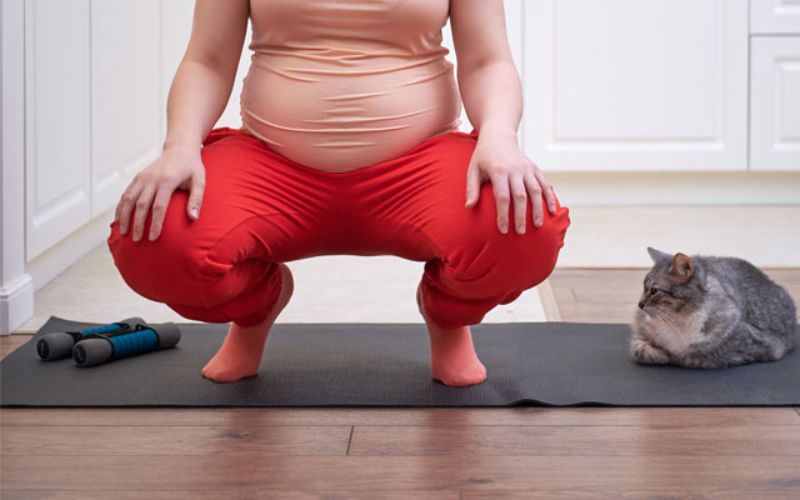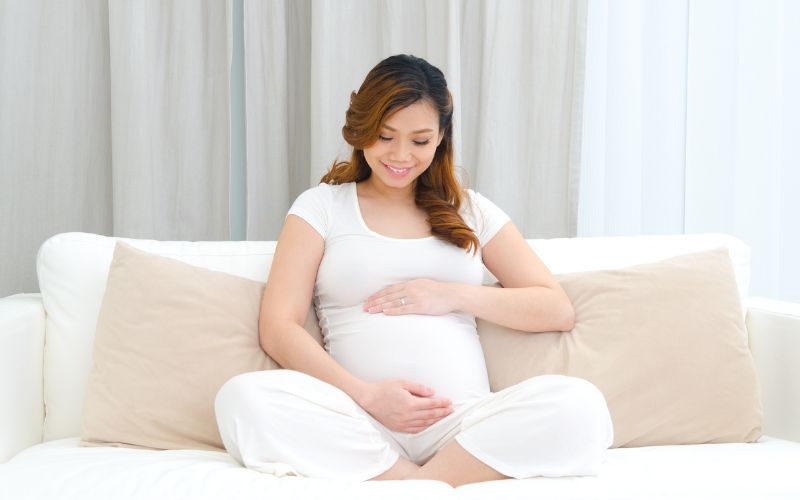Is it harmful for pregnant women to squat or sit on the floor? This is a common question, and the answer may surprise you. While it is not completely forbidden for expectant mothers to squat, it is important to be mindful of the potential risks. Prolonged squatting or repetitive squatting during pregnancy can have negative effects.
1. Can Pregnant Women Squat?
According to ThS-BS Huynh Kim Dung from Phuong Chau International General Hospital in Can Tho, squatting while pregnant is not an absolute taboo. However, it is important to be mindful of the potential risks. Prolonged squatting or repetitive squatting during pregnancy can place strain on the muscles and cause discomfort or even swelling. It can also increase the risk of falling, which could be dangerous for both mother and child. Additionally, squatting can put pressure on the bladder, causing pain and discomfort. As such, it is best to avoid prolonged squatting during pregnancy to maintain overall health.
 Should Pregnant Women Squat?
Should Pregnant Women Squat?
2. Can Pregnant Women Sit on the Floor?
It is a common belief that pregnant women should not sit on the floor with their legs crossed. As the pregnancy progresses and the bump grows, sitting on the floor can compress the lower limbs, affecting blood circulation and potentially causing swelling, numbness, and pain in the legs. Additionally, it can lead to abdominal and back pain, and make it difficult to get up. Therefore, it is advisable for pregnant women to avoid sitting on the floor for extended periods of time.
 Should Pregnant Women Sit on the Floor?
Should Pregnant Women Sit on the Floor?
3. Other Sitting Positions to Avoid During Pregnancy
In addition to squatting and sitting on the floor, there are a few other sitting positions that pregnant women should avoid:
-
Crossing your legs: This can compress the thigh nerves, leading to swelling, joint pain, and even spinal problems.
-
Half-lying, half-sitting position: While this may feel comfortable initially, it can place significant pressure on the spine and cause pain when getting up.
-
Leaning back: This can exacerbate back pain.
-
Bending forward: This position is not only uncomfortable but can also be harmful to the baby. It puts pressure on the abdomen and can compress the fetus.
 Other Sitting Positions to Avoid During Pregnancy
Other Sitting Positions to Avoid During Pregnancy
4. Tips for Safe Sitting During Pregnancy
-
Sit up straight: Maintain a straight back, and keep your shoulders and hips aligned with the back of the chair.
-
Adjust chair height: Ensure your chair is not too high or too low.
-
Use a small back cushion: This can help reduce back pain.
-
Avoid sitting for too long: Get up and move around regularly.
-
When sitting down, lower yourself onto the outer edge of the chair and then scoot in: This reduces the pressure on your back and abdomen.
-
Stand up slowly: Avoid sudden movements.
 Tips for Safe Sitting During Pregnancy
Tips for Safe Sitting During Pregnancy
In conclusion, while squatting and sitting on the floor are not absolutely forbidden for pregnant women, it is important to be mindful of the potential risks and adjust your sitting habits accordingly. Taking care of your posture and avoiding prolonged periods of sitting in certain positions can help ensure a healthy pregnancy.
Source: Vietnamese Women’s Newspaper
Exploring the Pros and Cons of Investing in a Foot Massager
Looking to improve your health and wellbeing? A foot massager may be the perfect option for you. You’ll find out in this article who should be using a foot massager, as well as the health benefits it may offer and the precautions to take when purchasing and using one. Read on to learn more about the potential benefits of a foot massager.
Pregnant Women from COVID-19 Outbreak’>The Hidden Financial Risks for Pregnant Women from COVID-19 Outbreak
In a scientific study, researchers examined data from 598 hospitalized pregnant women with positive results for COVID-19. They discovered that approximately 75% of these women were asymptomatic, highlighting the potential for pregnant individuals to carry and transmit the virus without displaying any symptoms. This finding emphasizes the importance of regular testing and precautions to prevent the spread of COVID-19, especially among pregnant women. The study also revealed a higher likelihood of preterm birth and cesarean delivery among COVID-19 positive pregnant women, reinforcing the need for additional care and monitoring during pregnancy for those affected by the virus. By understanding the impact of COVID-19 on pregnant individuals, healthcare providers can better support and protect this vulnerable population.



































